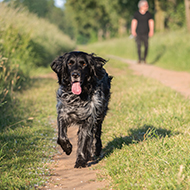Two more cases of Alabama Rot confirmed in UK

Anderson Moores Veterinary Specialists has launched a website to provide pet owners with more information.
Two more cases of cutaneous and renal glomerular vasculopathy (CRGV) have been confirmed in the UK by Anderson Moores Veterinary Specialists.
CRGV, also known as Alabama Rot, has a 90 per cent mortality rate, and the new cases take the total of confirmed cases in the UK from 1 January 2022 to five.
David Walker, who is the UK's foremost authority on the disease, said: “We’re very sad to confirm two further cases of CRGV. Unfortunately, we find ourselves at the time of year when cases are most commonly identified.
“It is understandably worrying for dog owners; however, I must stress that this disease is still very rare.
“We’re advising dog owners across the country to remain calm but vigilant and seek advice from their vets if their dog develops unexplained skin lesions.”
The new cases were discovered in Bristol and Kingsbridge, Devon, and take the total number of confirmed cases in the country up to 284, since the disease was first detected in the UK in the late 1980s.
Anderson Moores Veterinary Specialists has launched a recent website dedicated to Alabama Rot, which provides pet owners with advice and information, along with a live map of confirmed cases, allowing dog owners to be vigilant.
Commenting on the disease, David Walker said: “We have been at the forefront of research into CRGV for almost a decade and have witnessed first-hand the often-devastating effects of the disease.
“Treatment largely revolves around management of the sudden onset kidney failure and, sadly, with our current understanding of the disease, is only successful in around 10 per cent of cases.
“In launching this new website, we aim to give both pet owners and colleagues across the industry as much information as possible about CRGV.”



 With Strangles Awareness Week just around the corner (5-11 May), vets are being encouraged to share a survey about the disease with their horse-owning clients.
With Strangles Awareness Week just around the corner (5-11 May), vets are being encouraged to share a survey about the disease with their horse-owning clients.